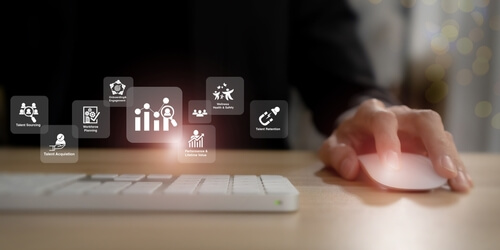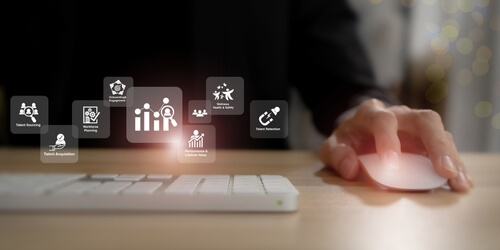
Professional employer organizations (PEOs) offer far more than outsourced HR management and third-party services to supplement your internal team's efforts. They also provide HR technology that can streamline your operations. Today's HR platforms can significantly increase productivity, reduce the risk of errors or non-compliance, and boost employee engagement by eliminating repetitive and tedious tasks.

In this post, we'll take a closer look at the business benefits of incorporating HR technology into your processes and discuss how they can help you maintain accuracy and ensure you uphold data quality standards.
Automate Data Entry
HR technology offers a wide range of benefits to companies that use it, such as longer-lasting and more organized records, better information security, and easier authorized usage. But one of the most significant benefits is the automation it offers. HR departments can use these programs to eliminate repetitive manual data entry across multiple fields and pages, reducing the risk of error and shrinking the time it takes to perform tasks.
That can be useful across every branch of HR, from payroll services to day-to-day operations. Consider onboarding processes as an example. Crucial data, like new employee information, will only need to be entered into the system once, and new hires will often handle that themselves (which further reduces the risk of error). Then, the information instantly transposes itself across relevant tasks, profiles, and records. HR programs can send the information to payroll software, benefits enrollment tools, and onboarding checklists—without multiple employees having to copy, access, or record it in multiple places. Having fewer hands involved in this process lowers the chances of copying it wrong and making sensitive information accessible to too many people.
Centralized Access to Data
As an extension of HR technology that automatically feeds relevant data fields to the right programs, your organization now has a centralized database of details that operates as a single source of truth. Authorized employees and individual users can access documents and records from their portals without downloading copies and keeping them in unprotected local servers. The centralized database also provides better data integrity. As information is updated, downstream programs also update, ensuring everything is up-to-date and everyone is on the same page.
Companies with staff across multiple locations, third-party support services, or work-from-home employees benefit from this centralized system access. It makes critical information easily accessible to disparate teams, ensuring everyone pulls from the same data. That increases productivity, reduces errors, and maintains data security best practices.
Provide Smoother Employee Experiences
Automation improves work for everyone involved. With well-integrated automation platforms, employees across all departments can access their profiles and documents, change elements like payroll deductions and retirement benefits, and quickly receive documentation. HR staff can also easily access individual or aggregated data to maintain records or complete tasks more quickly.
One of HR technology's most essential but often undervalued benefits is how it improves employee experiences. Your general employees will feel more comfortable and confident if they can access their records and make changes without delays or frustration. Your HR team will also experience less stress, burnout, and frustration when they can accomplish their tasks without spending all day searching for records or completing small, tedious tasks.
Today's HR technology also must meet continuously changing accessibility standards. Companies can accommodate employee needs and significantly simplify tasks with better visual, audio, and organizational schema behind each platform's design.
Have Confidence in Your Compliance
There are two major compliance risks in HR departments and companies – the non-compliance you suspect may be filtering through your best efforts and the non-compliance you can't see. Both pose a significant risk to your business. Failing to comply with data security measures makes your business a target and can compromise your employees, brand, and customers.
Whereas failing to comply with HR-specific standards can result in:
- Accidental bad practices that hurt or harm your employees
- Legal action and penalties
- Damaging employee and customer confidence
With better HR technology, you can standardize your processes and better ensure compliance with HR standards. That includes complying with fair hiring practices, payroll and scheduling norms, safety and educational requirements, and more. PEOs can recommend or operate through platforms that automatically comply with applicable standards and alert personnel when potential non-compliance is detected.
HR technology's other improved benefits – such as automatic data energy and central data access – will make it easier to ensure compliance. Your team or PEO can internally audit records to double-check compliance, make sure records are clear, and better understand your internal compliance efforts. That, in turn, makes it easier to prove compliance to state and third-party regulators.
PEOs Provide Third-Party Services and Enterprise-Level HR Tech
Direct access to enterprise-level HR technology can be cost-prohibitive. But when you work with a PEO, they can provide access to these tools and help manage your HR operations through them. You can improve your business processes and day-to-day employee experiences without taking on the costs of purchasing, installing, and maintaining the programs yourself. Their ongoing guidance can also help you adapt to changes in your business and adjust to changing economic trends or the normal challenges of a growing business. The expertise, support, and services PEOs provide can empower you to better transform your company's HR processes.

